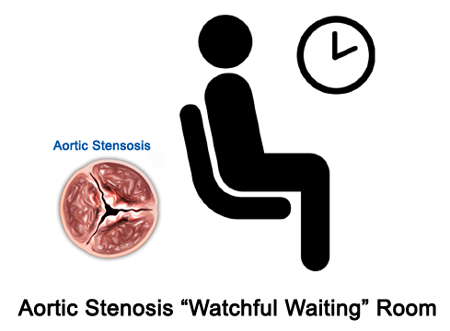“If I Have Moderate Aortic Stenosis, Why Should I Wait To Have Valve Replacement Surgery?” Asks Paul
By Adam Pick on January 25, 2012
I just had a very interesting conversation with Paul about the progression of aortic stenosis and the timing of heart valve replacement surgery.
During our chat, Paul asked, “Adam – I am 71 and have been diagnosed with aortic stenosis for over 10 years now. Recently, the disease progressed from mild to moderate. My cardiologist does not believe surgery is needed yet. I don’t want the stenosis to become ‘severe’ knowing the damage it can cause. Why am I being told to wait for surgery? Thanks, Paul”

Paul asked a great question. That said, I wanted to provide Paul a great answer.
So, I contacted Dr. Ali Khoynezhad, a leading cardiac surgeon at Memorial Care in Long Beach, California. During his career, Dr. Khoynezhad has performed over 1,700 cardiac procedures of which more than 650 involved heart valve surgery.

Dr. Ali Khoynezhad
In his response to Paul’s question, Dr. Khoynezhad first addressed symptoms related to a narrowed, aortic heart valve:
If the patient is asymptomatic and has moderate aortic stenosis, the patient will not require an operation… Because the risk of the operation is greater than ‘watchful waiting’. However, close follow-up with serial echocardiography is warranted — every one to two years.
Dr. Khoynezhad continued to discuss surgical approaches for patients experiencing aortic valve stenosis symptoms:
Onset of symptoms in patients with severe or moderate aortic stenosis is an indication for aortic valve surgery. Outcomes of aortic valve replacement vary significantly at different cardiac centers. Some patients seek their heart surgeon in advance, so they are prepared when they develop symptoms of aortic valve stenosis. Heart valve replacement through a mini-sternotomy is an attractive alternative that cuts down on recovery and hospital stay. This option should be discussed with your heart surgeon. Alternatively, transcatheter valve replacement — without use of heart-lung machine — is also an attractive alternative in high-risk patients with severe aortic stenosis.
Thanks to Paul for his question and a special thanks to Dr. Khoynezhad for sharing his clinical expertise with our community. To learn more about Dr. Khoynezhad, please click here.
Keep on tickin!
Adam
|
Dave Harris says on January 25th, 2012 at 2:30 pm |
|
Patients with aortic stenosis can be observed for many years, and the situation usually remains stable. Once symptoms ensue, ie shortness of breath, dizziness or fainting spells, or chest pain, the risk of sudden death rises exponentially, so valve replacement should then be done soon. |
 |
|
Gene Parrish says on January 25th, 2012 at 2:57 pm |
|
I have moderate aortic regurgitation and I am asymptomatic – valve is bicuspid. Do the same guidelines apply to my situation? I am a 61 year old male, and had open chest surgery three years ago to repair an ascending aortic aneurysm. The valve was not regurgitant at the time of my operation, so the surgeon decided that I would be better off to keep my native valve for as long as it would last. |
 |
|
Dave Harris says on January 25th, 2012 at 3:14 pm |
|
As soon as you mentioned bicuspid valve, I immediately started wondering about your ascending aorta. Bicuspid valves are associated with aneurysms of the ascending aorta. If the valve primarily needs replacement, the ascending aorta should be replaced too if it measures 4.0cm. Normally an ascending aorta should be replaced if it measures over 5.0cm. |
 |
|
Kerrigan says on January 25th, 2012 at 5:37 pm |
|
At 65 the watchful waiting of the asymptomatic bad valve turned into “you’ll probably have a severe symptom, like a heart attack, within 2-4 months.” Thinking it was better to operate on a “healthy heart” instead of waiting for it to be damaged, I opted for the surgery with a pig tissue valve. |
 |
|
Audrey Schmida says on January 25th, 2012 at 8:31 pm |
|
It doesn`t matter what anyone tells you; knowing that inevitably you have to have heart surgery makes it harder to accept that you are being diagnosed with a “waiting period”, in which any kind of heart damage can occur. I have the same diagnosis…..I am too healthy fo open heart valve repair. |
 |
|
Tawnya Crawford says on January 26th, 2012 at 1:23 pm |
|
I have a similar question for a pediatric patient. here’s our background: finally, my question….from what i understand, the mitral valve will have to be replaced. although her overall function is still acceptable (according to her cardiologist), we feel we are walking a fine line before heart failure begins. what would you advise, generally, for timing of this surgery? what are the most concerning risk/benefits? in a nutshell, should we wait for verifiable heart failure criteria before risking surgery, or would that be too late? can valves be replaced on a heart with muscle damage? |
 |
|
Audrey Schmida says on January 26th, 2012 at 8:32 pm |
|
Tawny: |
 |
|
Tawnya Crawford says on January 26th, 2012 at 11:43 pm |
|
Audrey…and others, i am to take her to the ER during her next ‘headache’ episode for another echo. i have had her blood pressure taken during these episodes and her diastolic pressure was raised to 78-88, which is significantly higher than her ‘normal’ in the 50s. dr doesn’t believe this is possible. ??? |
 |










